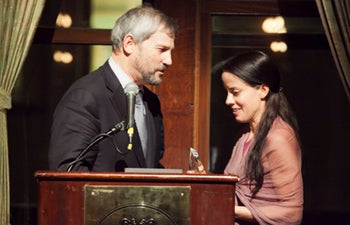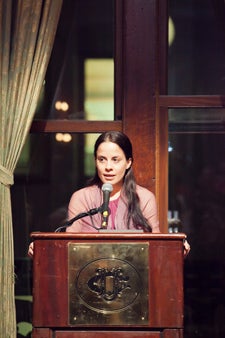USC Dornsife Alumna Wins Prize for Debut Novel
When Bonnie Nadzam began to develop characters for her dissertation in USC Dornsife’s Ph.D. in Literature and Creative Writing program, she could not have predicted the shape they would eventually take. It wasn’t until after she completed the first draft that she realized a main character she had written as a woman really should be a little girl.
That character morphed into 11-year-old Tommie, an unpopular girl, who befriends David Lamb, a misguided middle-aged man. The May-December friendship in the USC Dornsife alumna’s first novel Lamb (Other Press, 2011) becomes increasingly complex.
Nadzam’s compelling and at times unsettling story won The Center for Fiction‘s Flaherty-Dunnan First Novel Prize for the best debut novel of 2011. The winner was announced during the center’s First Novel Fête held in New York City in December. Nadzam was startled when her name was called.
“I didn’t realize for perhaps a full minute that I had to stand up, or go accept something, or say anything in response,” said Nadzam who earned her Ph.D. in 2011. “It was a strange moment.”

Nadzam accepts the honor from Karl Marlantes, 2010 Flaherty-Dunnan First Novel Prize winner, during The Center for Fiction’s First Novel Fête. Photo by Beowulf Sheehan.
Established in 2005, Nancy Dunnan, a board member of The Center for Fiction, funds the award named after her father, Ray W. Flaherty. The winner of the annual prize receives $10,000.
Nadzam wrote and re-wrote Lamb over a three-year period. The first draft — which she penned as a student — helped to shape the characters and the story. The second draft, or what Nadzam refers to as “the real first version” became the prize-winning book.
“I wrote a fairly awful, directionless first draft very quickly and without stopping or going back,” she said. “It was about getting to know the characters, the landscape, the basic nuts-and-bolts of what happened, and when. Once I had some sense of what this story was about, and who the characters were, I started all over again on page one.”
The novelfocuses on the complications that arise in a manipulative and destructive friendship. When David meets Tommie in a drugstore parking lot, he has just buried his father and divorced his wife, and is maintaining a relationship with the “other woman” in his marriage. Upon learning that Tommie has no friends and appears to be unhappy at home, David convinces himself that he is doing the right thing by abducting her.
“Bonnie’s book is beautifully written on a sentence level and also takes on a very complex relationship without shirking from massively gray areas,” said Aimee Bender, professor of English in USC Dornsife who served on Nadzam’s dissertation committee. “It’s hard to know how to interpret some of the moments. Bonnie is testing our morality and our comfort levels in really interesting ways.”

Nadzam addresses the audience during the center’s First Novel Fête in New York City in December. Photo by Beowulf Sheehan.
The disturbing relationship continues when David convinces Tommie to join him on a road trip to his cabin in the Rockies:
He put his arm around her shoulders and when she turned to look up at him he stooped beside the trash can and took her face in his hands and brushed the tears from her freckled cheeks with the edge of his sleeve, wiped it on his jeans. “Do you want to go home, Tommie? Shall I take you home to your mother?”
“Yes.” Her chest broke open now and she snorted and inhaled stuttering breath. “No.” She looked to him for help.
As the characters drive into the woods, they move farther away from reality and deeper into a journey that changes them both in ways neither expects.
“I started with a feeling from my own life — a feeling of being deluded in a relationship with someone, and how such delusion usually involves some kind of narrative both people are telling themselves and each other — consciously and unconsciously,” Nadzam said.
While at USC, Nadzam was influenced by many professors including Bender; Percival Everett, Distinguished Professor of English and director of USC Dornsife’s Ph.D. in Literature and Creative Writing program; and T.C. Boyle, Distinguished Professor of English.
“Bonnie’s novel is extraordinary,” Boyle said. “She took on a very riveting and provocative subject and made it into an emotionally gripping read with a strange love story that really worked. Her technique of using short clipped lines and building so much of the narrative from dialogue propels the novel so beautifully that it’s hard to put down.”
Nadzam is currently compiling her short stories into a collection and is writing a second novel. She understands that the subject matter in Lamb is unconventional and appreciates that readers take their time with the material.
“I realize it’s not a comfortable book to read,” she said. “That a person sets time aside from his or her life and reads it — bears witness to the kinds of manipulation and delusion that some relationships can foster — that’s more than I can ask for. I do love to hear it, though, when someone takes something from the book I didn’t even have any idea was in it.”